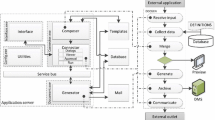Abstract
Design-time quality analysis of software architectures evaluates the impact of design decisions in quality dimensions such as performance. Architectural design decisions decisively impact the energy efficiency (EE) of software systems. Low EE not only results in higher operational cost due to power consumption. It indirectly necessitates additional capacity in the power distribution infrastructure of the target deployment environment. Methodologies that analyze EE of software systems are yet to reach an abstraction suited for architecture-level reasoning. This paper outlines a model-based approach for evaluating the EE of software architectures. First, we present a model that describes the central power consumption characteristics of a software system. We couple the model with an existing model-based performance prediction approach to evaluate the consumption characteristics of a software architecture in varying usage contexts. Several experiments show the accuracy of our architecture-level consumption predictions. Energy consumption predictions reach an error of less than 5.5% for stable and 3.7% for varying workloads. Finally, we present a round-trip design scenario that illustrates how the explicit consideration of EE supports software architects in making informed trade-off decisions between performance and EE.
Access this chapter
Tax calculation will be finalised at checkout
Purchases are for personal use only
Preview
Unable to display preview. Download preview PDF.
Similar content being viewed by others
References
Barroso, L.A., Clidaras, J., Hölzle, U.: The Datacenter as a Computer: An Introduction to the Design of Warehouse-Scale Machines, 2 edn. Synthesis Lectures on Computer Architecture. Morgan & Claypool Publishers (2013)
Basmadjian, R., Ali, N., Niedermeier, F., de Meer, H., Giuliani, G.: A methodology to predict the power consumption of servers in data centres. In: e-Energy 2011: Proc. of the 2nd International Conf. on Energy-Efficient Computing and Networking, pp. 1–10. ACM, New York (2011)
Becker, M., Becker, S., Meyer, J.: SimuLizar: design-time modelling and performance analysis of self-adaptive systems. In: Proc. of the Software Engineering Conf. (SE 2013), February 2013
Becker, S., Koziolek, H., Reussner, R.: The Palladio component model for model-driven performance prediction. Journal of Systems and Software 82(1), 3–22 (2009)
Bircher, W., John, L.: Complete System Power Estimation Using Processor Performance Events. IEEE Transactions on Computers 61(4), 563–577 (2012)
Brunnert, A., Wischer, K., Krcmar, H.: Using architecture-level performance models as resource profiles for enterprise applications. In: Proc. of the 10th International ACM SIGSOFT Conf. on Quality of Software Architectures (QoSA 2014), pp. 53–62. ACM, New York (2014)
Calheiros, R.N., Ranjan, R., Beloglazov, A., De Rose, C.A.F., Buyya, R.: CloudSim: A Toolkit for Modeling and Simulation of Cloud Computing Environments and Evaluation of Resource Provisioning Algorithms. Softw. Pract. Exper. 41(1), 23–50 (2011)
Fan, X., Weber, W.D., Barroso, L.A.: Power Provisioning for a Warehouse-sized Computer. SIGARCH Computer Architecture News 35(2), 13–23 (2007)
Greenberg, A., Hamilton, J., Maltz, D.A., Patel, P.: The Cost of a Cloud: Research Problems in Data Center Networks. SIGCOMM Comput. Commun. Rev. 39(1), 68–73 (2008)
Isci, C., Martonosi, M.: Runtime power monitoring in high-end processors: methodology and empirical data. In: Proc. of the 36th Annual IEEE/ACM International Symposium on Microarchitecture. IEEE Computer Society, Washington (2003)
Kansal, A., Zhao, F., Liu, J., Kothari, N., Bhattacharya, A.A.: Virtual machine power metering and provisioning. In: Proc. of the 1st ACM Symposium on Cloud Computing, pp. 39–50. ACM, New York (2010)
Kurowski, K., Oleksiak, A., Pia̧tek, W., Piontek, T., Przybyszewski, A., Wȩglarz, J.: DCworms - A tool for simulation of energy efficiency in distributed computing infrastructures. Simulation Modelling Practice and Theory 39, 135–151 (2013)
Martens, A., Koziolek, H., Prechelt, L., Reussner, R.: From monolithic to component-based performance evaluation of software architectures. Empirical Software Engineering 16(5), 587–622 (2011)
Meedeniya, I., Buhnova, B., Aleti, A., Grunske, L.: Architecture-driven reliability and energy optimization for complex embedded systems. In: Heineman, G.T., Kofron, J., Plasil, F. (eds.) QoSA 2010. LNCS, vol. 6093, pp. 52–67. Springer, Heidelberg (2010)
Memari, A., Vornberger, J., Marx Gómez, J., Nebel, W.: A Data center simulation framework based on an ontological foundation. In: EnviroInfo 2014 - ICT for Energy Efficiency, pp. 461–468. BIS-Verlag (2014)
Procaccianti, G., Lago, P., Lewis, G.A.: Green architectural tactics for the cloud. In: Working IEEE/IFIP Conf. on Software Architecture (WICSA 2014), pp. 41–44, April 2014
Raghavendra, R., Ranganathan, P., Talwar, V., Wang, Z., Zhu, X.: No “Power” Struggles: Coordinated Multi-level Power Management for the Data Center. SIGARCH Comput. Archit. News 36(1), 48–59 (2008)
Rivoire, S., Ranganathan, P., Kozyrakis, C.: A comparison of high-level full-system power models. In: Proc. of the 2008 Conf. on Power Aware Computing and Systems. HotPower 2008. USENIX Association, Berkeley (2008)
Seo, C., Edwards, G., Malek, S., Medvidovic, N.: A framework for estimating the impact of a distributed software system’s architectural style on its energy consumption. In: Working IEEE/IFIP Conf. on Software Architecture (WICSA 2008), pp. 277–280, February 2008
Stier, C., Groenda, H., Koziolek, A.: Towards Modeling and Analysis of Power Consumption of Self-Adaptive Software Systems in Palladio. Tech. rep., University of Stuttgart, Faculty of CS, EE, and IT, November 2014. ftp://ftp.informatik.uni-stuttgart.de/pub/library/ncstrl.ustuttgart_fi/TR2014-05/TR-2014-05.pdf
Author information
Authors and Affiliations
Corresponding author
Editor information
Editors and Affiliations
Rights and permissions
Copyright information
© 2015 Springer International Publishing Switzerland
About this paper
Cite this paper
Stier, C., Koziolek, A., Groenda, H., Reussner, R. (2015). Model-Based Energy Efficiency Analysis of Software Architectures. In: Weyns, D., Mirandola, R., Crnkovic, I. (eds) Software Architecture. ECSA 2015. Lecture Notes in Computer Science(), vol 9278. Springer, Cham. https://doi.org/10.1007/978-3-319-23727-5_18
Download citation
DOI: https://doi.org/10.1007/978-3-319-23727-5_18
Published:
Publisher Name: Springer, Cham
Print ISBN: 978-3-319-23726-8
Online ISBN: 978-3-319-23727-5
eBook Packages: Computer ScienceComputer Science (R0)




